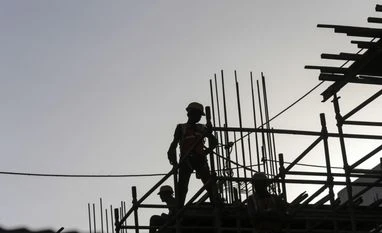The real estate sector received mixed signals from Budget 2024 after the Centre announced a higher allocation towards the urban housing scheme but withdrew the indexation benefits on sale of property.
Finance Minister Nirmala Sitharaman allocated Rs 10 trillion, including a central assistance of Rs 2.2 trillion, for the Pradhan Mantri Awas Yojana (Urban). This will help meet the housing requirements of 10 million urban poor and middle-class families over five years.
“Under the PM Awas Yojana Urban 2.0, housing needs of 10 million urban poor and middle-class families will be addressed with an investment of Rs 10 trillion,” the finance minister said in her speech.
“This will include the central assistance of Rs 2.2 trillion in the next five years,” she added.
Sitharaman also said the Centre plans to provide interest subsidies to facilitate home loans at affordable rates.
“Enabling policies and regulations for efficient and transparent rental housing markets with enhanced availability will also be put in place,” she added.
Also Read
Further, the minister said the government would facilitate rental housing with dormitory-type accommodation for industrial workers.
This will be done in public-private partnership (PPP) mode with viability gap funding (VGF) support and commitment from anchor industries.
Industry executives, while welcoming these steps, said they would benefit allied sectors also.
“This will drive construction in the urban and rural areas with a cascading effect on allied sectors. PPP financing and VGF for rental housing will help in meeting the housing needs of the poor. It will reduce the burden of the government through the traditional route,” said Badal Yagnik, chief executive officer (CEO), Colliers India.
“With a target of providing homes to 10 million families over the next five years, this initiative translates into approximately 2 million houses annually, marking a substantial increase from the previous scheme,” said Ravi Saund, founding director, Emperium Private Limited.
He added, “This surge in construction activity is expected to boost demand for building materials and rejuvenate related industries such as cement, steel, and home appliances.”
Sitharaman announced that the Centre would look at lowering duties for properties purchased by women and making it an “essential component of urban development schemes.”
On the tax front, however, Sitharaman proposed to withdraw the benefit of indexation for the calculation of long-term capital gains (LTCG) tax on property sales. The LTCG rate was lowered from 20 per cent to 12.5 per cent.
Indexation allows increasing the purchase price of an investment to adjust for inflation.
Amit Maheshwari, tax partner at AKM Global, said the indexation removal could lead to higher taxable gains, especially for properties held for a long time.
Following the announcement, realty stocks shed their gains made earlier in the day.
Nifty Realty closed 2.29 per cent lower, with major developers like Lodha, Brigade and Godrej Properties falling over 3 per cent.
In the post-Budget press conference, FM Sitharaman clarified that indexation benefits offered until April 1, 2001 would be protected. This means older properties, including legacy assets, would benefit.
Keyur Shah, partner and leader — financial services tax, EY India, said that removal of indexation could lead to a short-term effect on capital markets but it “does result in simplification of the overall capital gains regime.”
)